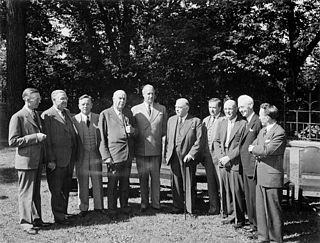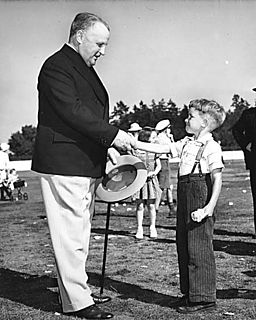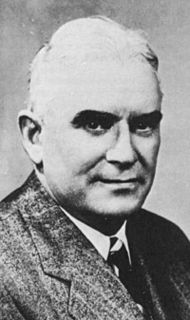The Provincial Party of British Columbia (PROV) was a political party in British Columbia, Canada.

British Columbia is the westernmost province of Canada, located between the Pacific Ocean and the Rocky Mountains. With an estimated population of 5.016 million as of 2018, it is Canada's third-most populous province.

Canada is a country in the northern part of North America. Its ten provinces and three territories extend from the Atlantic to the Pacific and northward into the Arctic Ocean, covering 9.98 million square kilometres, making it the world's second-largest country by total area. Canada's southern border with the United States, stretching some 8,891 kilometres (5,525 mi), is the world's longest bi-national land border. Its capital is Ottawa, and its three largest metropolitan areas are Toronto, Montreal, and Vancouver. As a whole, Canada is sparsely populated, the majority of its land area being dominated by forest and tundra. Consequently, its population is highly urbanized, with over 80 percent of its inhabitants concentrated in large and medium-sized cities, with 70% of citizens residing within 100 kilometres (62 mi) of the southern border. Canada's climate varies widely across its vast area, ranging from arctic weather in the north, to hot summers in the southern regions, with four distinct seasons.
Contents
It was formed by a group of British Columbia Conservative Party dissidents known as the "Committee of 100", led and funded by the wealthy General Alexander McRae and political elements from the United Farmers of British Columbia. The United Farmers had little influence over the merged party. The party was formed at a convention in Vernon on January 13, 1923. Sir Charles Hibbert Tupper, another Conservative dissident at the time, was involved to oppose the wild-cat schemes of McBride and Bowser and the unscrupulous government of Oliver. [1]
The British Columbia Conservative Party, or simply the BC Conservatives, is an active provincial political party in British Columbia, Canada. In the early half of the 20th century, the Conservatives competed with the British Columbia Liberal Party for power in the province. Since the 1950s however, the party has had only a minor presence, not having elected a member of the Legislative Assembly in a general election since 1975. The last sitting MLA for the Conservatives was John van Dongen, who briefly crossed the floor to the party in 2012 before leaving to sit as an independent.

Alexander Duncan McRae, C.B., was a successful businessman, a Major General in the Canadian Army in First World War, a Member of Parliament, a Canadian Senator and a farmer.
The United Farmers of British Columbia was a union of farmers established in 1917. Unlike some of their sibling United Farmers organizations in other provinces, the United Farmers of British Columbia were never directly incorporated as a full political party in their own right, although two candidates stood under the United Farmers banner in the 1920 provincial election, and the United Farmers subsequently participated in the creation of the Provincial Party of British Columbia.
The party platform sought freight rate equalization, cooperation with the federal government in the development of a northern railway, the elimination of Oriental labour, abolition of patronage, hiring of veterans, the elimination of income tax which had been introduced as a temporary measure during the war.
The party nominated candidates only once, for the 1924 election. In that election, McRae claimed that the Liberal government of John Oliver and the previous administrations of Conservative Premier William John Bowser, then the opposition leader, were corrupt. Many of his allegations were related to the funding of the Pacific Great Eastern Railway plan to reach Prince George in the Northern interior of the province, which was not achieved until many years later. He claimed that there were kickbacks, patronage and various wrongdoings. His allegations were never proven. The election was bitterly fought with sensational allegations against all three leaders.
The British Columbia Liberal Party is a centre-right provincial political party in British Columbia, Canada. The party currently forms the Official Opposition. The leader of the Liberal Party, and Leader of the Official Opposition of British Columbia, is Andrew Wilkinson.

John Oliver was a politician and farmer in British Columbia, Canada.
Although the party achieved 24% of the popular vote in the 1924 election, McRae was not elected. Both Bowser and Oliver lost their seats but Oliver continued to lead his Liberal Party as Premier of a minority government after the election.
McRae reconciled with his former Conservative allies after the election and went on to federal politics. The Provincial Party disappeared.






